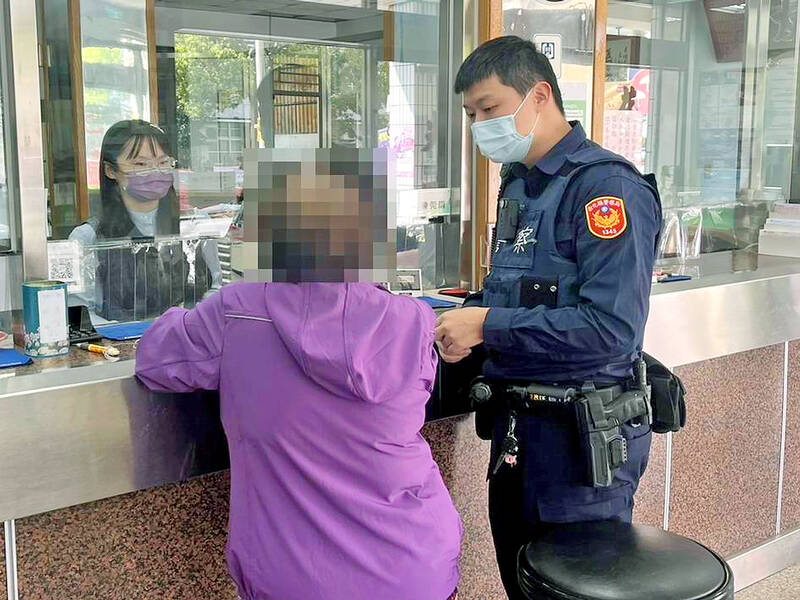The Criminal Investigation Bureau (CIB) on Sunday said that scammers posing as judicial officials and prosecutors have defrauded their victims of a total of NT$800 million (US$26.1 million at the current exchange rate) last year.
More than 70 percent of the victims were aged 50 or older, with most of them being in their 60s and 70s, the CIB said.
“Elderly and retired people who mostly stay at home and have little interaction with the outside world are more likely to become victims,” CIB officials said.

Photo courtesy of the Changhua County Police Department
The scammers generally use sentences such as “Someone is using your personal ID number,” “I cannot divulge the details of an ongoing investigation,” “I need to monitor your bank account,” “You are suspected of being engaged in money laundering or illegal money transfer,” and “Provide your Line messaging app details for updates on the case,” the officials said.
People who receive a call from an unknown number about a criminal investigation, or about receiving official documents from government agencies, must first ask for the caller’s name, job title and which agency they work for, the CIB said.
They should then call that agency to check whether the call was genuine, it said.
Judicial officials never take statements over the telephone and would never ask people to transfer money, hand over their bank cards or ask for cash, the CIB said.
Citing a recent case, the CIB said a retired doctor in Kaohsiung lost NT$60.5 million to such a scam.
The doctor, surnamed Liu (柳), who is in his 70s, said he received a call from a person posing as a section chief at his local household registration office who told him that someone had come to the office with his ID card to obtain new household documents.
Liu said he was alarmed about possible identity fraud upon receiving the call.
A second scammer posing as a police officer later called him, saying that an investigation was under way about a suspected criminal using Liu’s ID card to engage in kidnapping and extortion, adding that the case was being handled by a prosecutor surnamed Lin (林).
In the next phase of the scam, Liu received calls from a scammer posing as the prosecutor, who said Liu was embroiled in the crime as an accomplice, because he had failed to appear for questioning after being summoned.
The scammer said Liu had to cooperate with the investigation to clear his name and told him to hand over information about his bank accounts so that they could be monitored to prevent money laundering.
They then asked to meet with Liu in person, the CIB said.
When they met, scammers posing as the prosecutor and the police officer presented Liu with documents that appeared to be from the local prosecutors’ office, complete with stamps.
Liu at the meeting handed over his six bank cards to the scammers, the CIB said.
The scammers transferred all the money in the accounts, totaling NT$53 million, to another account purportedly controlled by the prosecutors’ office for “safekeeping.”
They then targeted Liu’s other assets under the guise of investigating his suspected money laundering activities.
Liu eventually took out a NT$7.5 million loan from a bank by using his own home as collateral and transferred the money to a bank account owned by the scammers, the CIB said.

An essay competition jointly organized by a local writing society and a publisher affiliated with the Chinese Communist Party (CCP) might have contravened the Act Governing Relations Between the People of the Taiwan Area and the Mainland Area (臺灣地區與大陸地區人民關係條例), the Mainland Affairs Council (MAC) said on Thursday. “In this case, the partner organization is clearly an agency under the CCP’s Fujian Provincial Committee,” MAC Deputy Minister and spokesperson Liang Wen-chieh (梁文傑) said at a news briefing in Taipei. “It also involves bringing Taiwanese students to China with all-expenses-paid arrangements to attend award ceremonies and camps,” Liang said. Those two “characteristics” are typically sufficient

A magnitude 5.9 earthquake that struck about 33km off the coast of Hualien City was the "main shock" in a series of quakes in the area, with aftershocks expected over the next three days, the Central Weather Administration (CWA) said yesterday. Prior to the magnitude 5.9 quake shaking most of Taiwan at 6:53pm yesterday, six other earthquakes stronger than a magnitude of 4, starting with a magnitude 5.5 quake at 6:09pm, occurred in the area. CWA Seismological Center Director Wu Chien-fu (吳健富) confirmed that the quakes were all part of the same series and that the magnitude 5.5 temblor was

The brilliant blue waters, thick foliage and bucolic atmosphere on this seemingly idyllic archipelago deep in the Pacific Ocean belie the key role it now plays in a titanic geopolitical struggle. Palau is again on the front line as China, and the US and its allies prepare their forces in an intensifying contest for control over the Asia-Pacific region. The democratic nation of just 17,000 people hosts US-controlled airstrips and soon-to-be-completed radar installations that the US military describes as “critical” to monitoring vast swathes of water and airspace. It is also a key piece of the second island chain, a string of

The Central Weather Administration has issued a heat alert for southeastern Taiwan, warning of temperatures as high as 36°C today, while alerting some coastal areas of strong winds later in the day. Kaohsiung’s Neimen District (內門) and Pingtung County’s Neipu Township (內埔) are under an orange heat alert, which warns of temperatures as high as 36°C for three consecutive days, the CWA said, citing southwest winds. The heat would also extend to Tainan’s Nansi (楠西) and Yujing (玉井) districts, as well as Pingtung’s Gaoshu (高樹), Yanpu (鹽埔) and Majia (瑪家) townships, it said, forecasting highs of up to 36°C in those areas